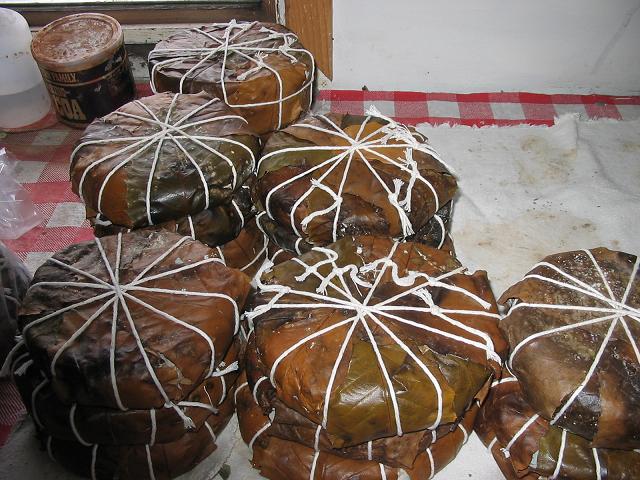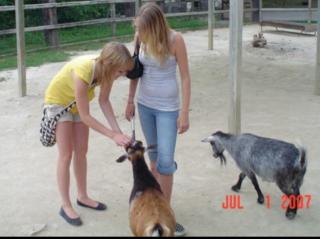It’s the phrase every food safety type has heard; experienced investigators will convey their disdain with a wry smile, rather than the full eye-rolling and gnashing of rookie teeth: “I’ve been making cheese (substitute your favorite food) this way for 30 years and I’ve never made anyone sick.
That’s the line Oroville, Washington, farmer Sally Jackson told a state inspector a few weeks ago as preliminary evidence linked Sally’s cheese  to an E. coli O157:H7 outbreak.
to an E. coli O157:H7 outbreak.
The Seattle Times reports this morning that over the past week, Jackson learned that eight cases of E. coli illness are likely linked with her products. On Friday, she announced a recall and is cooperating with government agencies.
It is the second time in two months that an artisan cheesemaker in Washington was connected with a bacteria that causes foodborne illnesses, though the reaction of the two cheesemakers could not have been more different.
Inspectors found Listeria monocytogenes in cheese made by the Estrella Family Creamery, and also repeatedly identified the bacteria in swabs of its Montesano facility, yet that Grays Harbor County dairy refused a request to recall its product. In October, the Food and Drug Administration obtained a court order forcing it to shut down. The creamery is battling the court action.
To her credit, Jackson said, "I do not want to be associated with their fight. The bottom line is, I don’t want to make anybody else sick."
Four cases of E. coli O157 came to the state Health Department’s attention in the fall, including the case of one woman who was briefly hospitalized. Laboratory tests confirmed the four were linked to each other. Four additional E. coli cases in Oregon, Minnesota and Vermont also were linked to the Washington outbreak via laboratory tests.
According to the state Department of Agriculture, one unopened cheese wheel tested positive for E. coli. Investigators are awaiting the results  from additional lab tests that will compare the strain of E. coli from the illnesses with that found in the cheese.
from additional lab tests that will compare the strain of E. coli from the illnesses with that found in the cheese.
For years, Jackson operated with few problems, however in the last year, inspectors have noted several violations at her facility, including finding that she did not sanitize equipment after use. She has worked to fix the problems.
She and a part-time helper milk 40 sheep, 12 goats and a cow named Renata. They sell to high-end restaurants, as well as retail stores across the country, and the cheeses are distinctively wrapped in grape leaves from neighbors’ farms.
Over the years, her products have been served in most Seattle fine-dining establishments, including Douglas’ Palace Kitchen. Gourmets rave about the quality, so news of the problem and the listeria issue at Estrella came as a shock.
Get over it. Fancy food doesn’t mean safe food.
.jpg) District, said the problem in a nutshell was one of being unfamiliar with the new technology.
District, said the problem in a nutshell was one of being unfamiliar with the new technology.
 James Apa, spokesman of Seattle and King County Public Health.
James Apa, spokesman of Seattle and King County Public Health..jpg) and low tides along ocean beaches and in Puget Sound allow the bacteria to thrive.
and low tides along ocean beaches and in Puget Sound allow the bacteria to thrive.
.jpg) recovering.
recovering. 
.jpg) posting letter grades, someone in D.C. decided, hey, we should do that too.
posting letter grades, someone in D.C. decided, hey, we should do that too. best tasting sprouts available. We pride ourselves in the quality of our product while strictly adhering to all local, state, and federal regulations and guidelines.”
best tasting sprouts available. We pride ourselves in the quality of our product while strictly adhering to all local, state, and federal regulations and guidelines.” —Deli sprouts in 4 oz. (UPC 8 79566 12305 4) and 5 oz. (UPC 0 33383 70267 4) containers.
—Deli sprouts in 4 oz. (UPC 8 79566 12305 4) and 5 oz. (UPC 0 33383 70267 4) containers. to an E. coli O157:H7 outbreak.
to an E. coli O157:H7 outbreak. from additional lab tests that will compare the strain of E. coli from the illnesses with that found in the cheese.
from additional lab tests that will compare the strain of E. coli from the illnesses with that found in the cheese. von Bismarck: “If you like laws and sausages, you should never watch either one being made.”
von Bismarck: “If you like laws and sausages, you should never watch either one being made.” are specified in advance, carefully measured out and accurately identified on a label. An inspector from the United States Department of Agriculture visits the plant every day.
are specified in advance, carefully measured out and accurately identified on a label. An inspector from the United States Department of Agriculture visits the plant every day. Commerce subcommittee meeting today to the
Commerce subcommittee meeting today to the  Maryland regulators believed DeCoster eggs were such a threat that they banned sales of the eggs in their states.
Maryland regulators believed DeCoster eggs were such a threat that they banned sales of the eggs in their states. for journalism.
for journalism.